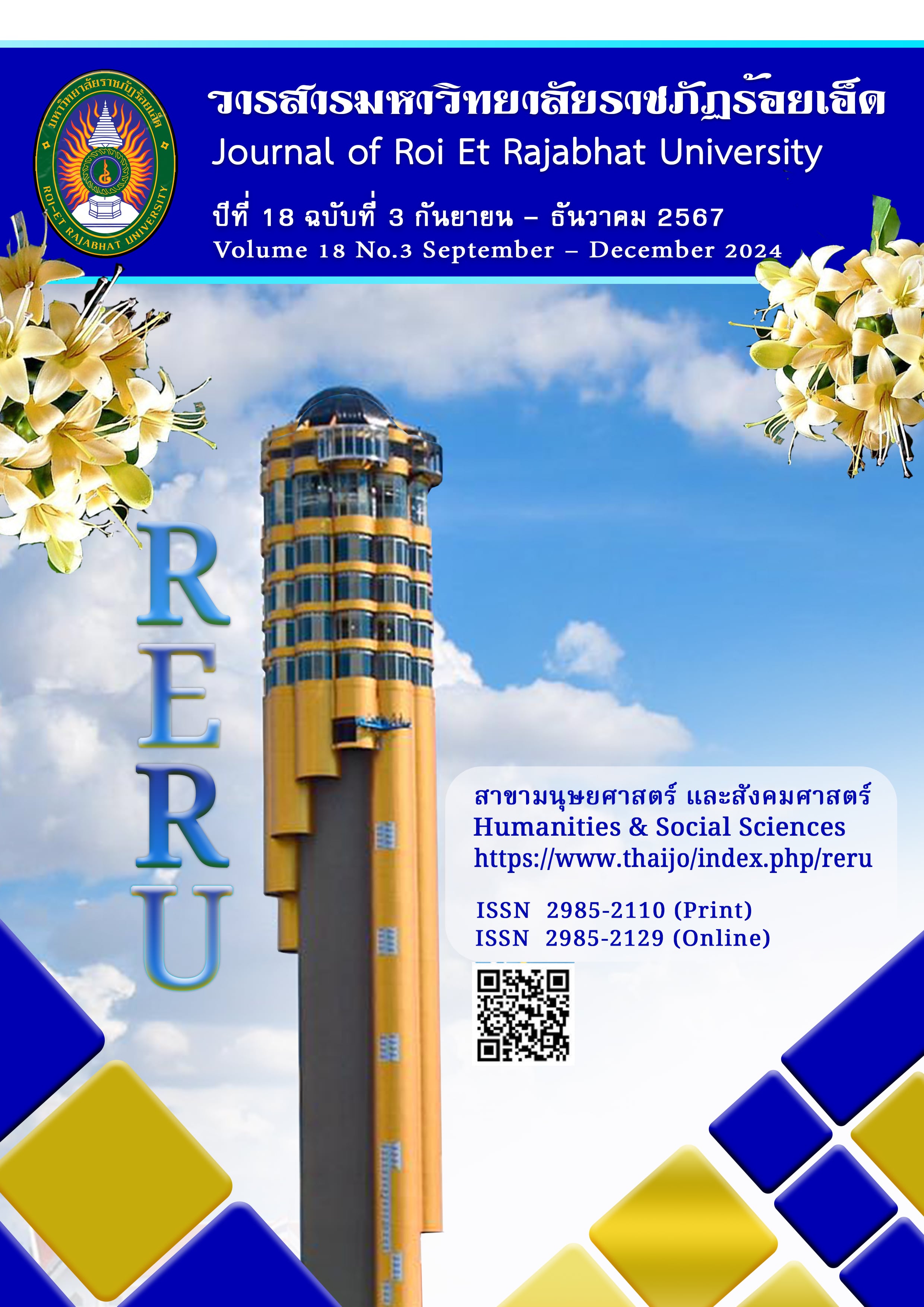Development a Model to create Professional Learning Community of Thai Language Teachers to Improve Critical Reading Skills of Lower Secondary School Level in Schools Under Secondary Educational Service Area Office Roi Et
Keywords:
Professional learning community, Thai language teacher, Critical reading SkillAbstract
This research aimed: 1) to investigate existing situations and desirable situations of learning management to develop critical reading skills of Thai language teachers at lower secondary school Level; 2) to develop a model of creating professional learning community of Thai language teachers to improve critical reading skills of lower secondary school level; 3) to explore the results of implementation of the model to create professional learning community of Thai language teachers to improve critical reading skills of lower secondary school level; and 4) to evaluate the model to create professional learning community of Thai language teachers to improve critical reading skills of lower secondary school level. The research and development were employed, which divided into four phases: 1) investigate existing situations and desirable situations of learning management to develop critical reading skills of Thai language teachers. The Informants consists of 10 school administrators and 12 teachers, and 110 Thai language teachers, who were respond to the existing and desirable situations; 2) develop a model of creating professional learning community of Thai language teachers. The informants were 20 experts. 3) explore the results of the model implementation. The informants were 12 target group of teachers; and 4) evaluate the model by 12 target group of teachers. The research instruments were interview form, questionnaire, and evaluation form. Statistics used were mean, and standard deviation. The research results were: 1) the existing situations of learning management to develop critical reading skills in overall was at a medium level, while desirable situations were at a high level; 2) a model of creating professional learning community consists of 6 elements as follows: rationale, objectives, process of professional learning community, process of learning, measurement and evaluation, and conditions of success. The model evaluation overall was at the highest level in aspect of propriety and feasibility; 3) The model implementation shown that the quality of learning management plan, and competency of learning management in overall was at the highest level. Teachers’ satisfaction toward the model was at the highest level. Students’ satisfaction toward learning management in overall was at the highest level; and 4) The model of professional learning community of Thai language teachers was at the highest level in the aspect of usefulness, feasibility, propriety, and accuracy.
References
เข็มทอง ศิริแสงเลิศ. (2561). การพัฒนาองค์การแห่งการเรียนรู้ในศตวรรษที่ 21. ประมวลสาระ ชุดวิชา นวัตกรรมการบริหารการศึกษาและภาวะผู้นำ หน่วยที่ 1-7. นนทบุรี: โรงพิมพ์มหาวิทยาลัยสุโขทัยธรรมธิราช.
ชูชาติ พ่วงสมจิตร์. (2560). ชุมชนการเรียนรู้ทางวิชาชีพในสถานศึกษา. วารสารศึกษาศาสตร์ มสธ, 10(1), 34-41.
ทิพย์วรรณ สุขใจรุ่งวัฒนา และธีรศักดิ์ อุ่นอารมณ์เลิศ. (2553). การศึกษาปัจจัยที่ส่งผลต่อพฤติกรรมการเรียน ที่ดีของนักศึกษาชั้นมัธยมศึกษาปีที่ 3. วารสารศิลปากรศึกษาศาสตร์วิจัย, 1(2), 126-139.
ทิศนา แขมมณี. (2556). รูปแบบการเรียนการสอน : ทางเลือกที่หลากหลาย. กรุงเทพฯ: จุฬาลงกรณ์มหาวิทยาลัย.
บุญเลี้ยง ทุมทอง. (2559). ทฤษฎีและการพัฒนารูปแบบการจัดการเรียนรู้ (พิมพ์ครั้งที่ 3). กรุงเทพฯ: ทริปเพิ้ล เอ็ดดูเคชั่น.
ปรณัฐ กิจรุ่งเรือง และอรพิณ ศิริสัมพันธ์. (2561). ยุทธวิธีการสอนเพื่อการเรียนรู้เชิงรุก: องค์ประกอบสำคัญ 5 ประการ สำหรับแผนการเรียนการสอน. ศิลปากรศึกษาศาสตร์วิจัย, 8(2), 386-389.
ประภาภาณ์ คำโอภาส. (2560). รูปแบบชุมชนการเรียนรู้ทางวิชาชีพของครูศูนย์การศึกษานอกระบบและการศึกษา ตามอัธยาศัยในเขตภาคเหนือตอนบน. ดุษฎีนิพนธ์ ปรัชญาดุษฎีบัณฑิต สาขาวิชาหลักสูตรและการสอน. เชียงใหม่: มหาวิทยาลัยเชียงใหม่.
พิมพันธ์ เดชะคุปต์ และพเยาว์ ยินดีสุข. (2561). การเรียนรู้เชิงรุกแนวรวมพลังกัน PLC เพื่อการพัฒนา. กรุงเทพฯ: โรงพิมพ์แห่งจุฬาลงกรณ์มหาวิทยาลัย.
พิมพันธ์ เดชะคุปต์ และพรทิพย์ แข็งขัน. (2551). สมรรถนะครูและแนวทางการพัฒนาครูในสังคมที่เปลี่ยนแปลง. สำนักงานเลขาธิการสภาการศึกษา. กรุงเทพฯ: พริกหวานกราฟฟิก.
วัชรา เล่าเรียนดี, ปรณัฐ กิจรุ่งเรือง และอรพิณ คิริสัมพันธ์. (2560). กลยุทธ์การจัดการเรียนรู้เชิงรุก เพื่อพัฒนาการคิด และยกระดับคุณภาพการศึกษา สำหรับศตวรรษที่ 21. นครปฐม: เพชรเกษมพริ้นติ้ง กรุ๊ป.
วิจารณ์ พานิช. (2554). วิถีสร้างการเรียนรู้เพื่อศิษย์ในศตวรรษที่ 21. กรุงเทพฯ: ตถาตา พับลิเคชั่น.
สฤษดิ์ วิวาสุขุ. (2565). รูปแบบชุมชนแห่งการเรียนรู้ทางวิชาชีพเพื่อพัฒนาการจัดการเรียนรู้เชิงรุก โรงเรียนจอมพระ ประชาสรรค์ สำนักงานเขตพื้นที่การศึกษามัธยมศึกษา เขต 33. วารสารสังคมศาสตร์และมานุษยวิทยาเชิงพุทธ, 7(2), 36-54.
สำนักงานเลขาธิการสภาการศึกษา. (2560). แผนการศึกษาแห่งชาติ พ.ศ. 2560-2579. กรุงเทพฯ: พริกหวานกราฟฟิค.
สำนักงานคณะกรรมการการศึกษาขั้นพื้นฐาน. (2561). การประเมินตนเองและจัดทำแผนพัฒนาตนเองรายบุคคล (Individual Development Plan : ID PLAN). กรุงเทพฯ: สำนักงานคณะกรรมการการศึกษาขั้นพื้นฐาน.
สำนักงานรับรองมาตรฐานและการประเมินคุณภาพภายนอก. (2557). สรุปผลการประเมินภายนอกรอบสาม เอกสารประกอบการประชุม วาระที่ 6.4.1. กรุงเทพฯ: สำนักงานรับรองมาตรฐานและการประเมินคุณภาพภายนอก.
Arends, R. I. (1997). Classroom Instruction and Management. New York: McGraw Hill.
Barber, M., Chijioke, C. and Mourshed, M. (2010). How the world’s most improved schoolsystems keep getting better. Retrieved May 24, 2004, from http://www.pearson.com/michael-barber.
Bloom, M. A. (1961). Taxonomy of Educational Objectives, Handbook: Cognitive Domain. New York: David McKay.
DuFour, R. and Eaker, R. (1998). Professional Learning Communities at Work: Best Practices for Enhancing Student Achievement. Bloomington, IN: Berlin: Solution Tree Press.
Hallam, J., Berdeni. D., Grayson R Guest, E. J., Holden, J., Lappage, M. G., Miller, M. T., Robinson, D. A., Turner, A., Leake, J. R. and Hodson, M. E. (2015). Trust and Collaboration in PLC Teams: Teacher Relationships, Principal Support, and Collaborative Benefits. NASSP Bulletin, 99(3), 193-216.
Hargreaves, A. (2003). Teaching In the Knowledge Society: Education in the Age of Insecurity. New York: Teacher College Press.
Hord, S. M. (2004). Learning Together, Leading Together: Changing Schools Through Professional Learning Communities. New York: Teachers College Press.
Hord, S. M. (2008). Leading Professional Learning Communities: Voices from Research and Practice. Thousand Oaks. California: Corwin.
Joyce, B. and Weil, M. (2000). Models of Teaching. Massachusetts: Allyn and Bacon.
Marlowe, B. A. and Page, M. L. (2005). Creating and Sustaining the Constructivist Classroom (2nd ed.). California: Corwin Press.
Saylor, J. G., Alexander, W. M. and Lewis, A. J. (1981) Curriculum Planning for Better Teaching and Learning (4th ed.). New York: Holt, Rinehart and Winston.
Stoll, L., Bolam, R., McMahon, A., Wallace, M., Thomas, S., Hawkey, K. and Smith, M. (2003). Professional Learning Community. New York: Open University Press.
Strahan, E. (2002). Moral, leadership: Getting to the Heart of School Improvement. San Francisco: Jossey-Bass.
Supovitz, J. (2002). Developing Communities of Instructional Practice. Teachers College Record, 10(4), 1591-1626.
Thompson, S. C., Gregg, L. and Niska, J. M. (2004). Professional learning communities, leadership, and student learning. RMLE Online, 28(1), 1-15.
Waters, T. and Cameron, G. (2005). The balanced leadership framework: Connecting vision with action. Denver, Colorado: Mid-continent Research for Education and Learning.
Wenger, E. C. and Snyder, W. M. (2000). Communities of Practice: The Organizational Factor. Harvard Business Review, 73(7), 139-145.
Downloads
Published
How to Cite
Issue
Section
License
Copyright (c) 2024 Roi Et Rajabhat University

This work is licensed under a Creative Commons Attribution-NonCommercial-NoDerivatives 4.0 International License.
บทความที่ได้รับการตีพิมพ์เป็นลิขสิทธิ์ของวารสารมหาวิทยาลัยราชภัฎร้อยเอ็ด
ข้อความที่ปรากฏในบทความแต่ละเรื่องในวารสารวิชาการเล่มนี้เป็นความคิดเห็นส่วนตัวของผู้เขียนแต่ละท่านไม่เกี่ยวข้องกับมหาวิทยาลัยราชภัฎร้อยเอ็ด และคณาจารย์ท่านอื่นๆในมหาวิทยาลัยฯ แต่อย่างใด ความรับผิดชอบองค์ประกอบทั้งหมดของบทความแต่ละเรื่องเป็นของผู้เขียนแต่ละท่าน หากมีความผิดพลาดใดๆ ผู้เขียนแต่ละท่านจะรับผิดชอบบทความของตนเองแต่ผู้เดียว





